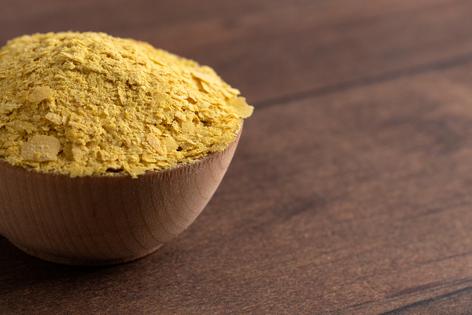Health benefits of nutritional yeast — and how to use it
Published in Health & Fitness
Nutritional yeast could be one of the tastiest and healthiest ingredients missing from your pantry. Though it is a great food for vegans and vegetarians, all people can gain health benefits from adding it to their diet. Read on for the what, why and how on nutritional yeast.
What is nutritional yeast?
This cheesy-tasting powder is made up of a type of yeast called Saccharomyces cerevisiae. It can be grown on many types of sugary substances, including molasses and sugar beets. Once the yeast is harvested, it is heated to deactivate it so it doesn’t froth up like active yeast. This dried fungus is then made into a powder, which can be fine or flaky, and — voila — nutritional yeast is ready to be enjoyed.
It helps prevent anemia in vegans.
Vitamin B12 is found mostly in animal-based foods, such as meat, fish, dairy and eggs. For this reason, longtime vegans can be at risk of vitamin B12 deficiency, which can cause anemia, fatigue and, in severe cases, neurological problems.
Luckily, unfortified nutritional yeast is a plant-based source of vitamin B12, with 260% of your daily needs in just 1/4 cup. Sprinkling this delicious nutty powder on snacks like popcorn throughout the week provides a sufficient amount of vitamin B12 for most people.
If you are a vegan, you may want to talk to your doctor or a registered dietitian about getting a blood test for vitamin B12 and possibly taking a supplement.
It’s high in antioxidants.
One study in Food & Function found that nutritional yeast significantly increased antioxidants and fiber when added to foods, especially if the foods were not cooked. Other studies have found that the specific antioxidants in nutritional yeast have moderate antimicrobial and antibacterial properties.
It may help alleviate IBS symptoms.
Nutritional yeast may help alleviate symptoms of irritable bowel syndrome, which is one of the most common gut disorders in the U.S. A 2015 study found that nutritional yeast consumption significantly reduced abdominal pain and discomfort in people with IBS. A meta-analysis in the World Journal of Gastroenterology found a clinically significant decrease in abdominal pain, discomfort and bloating for those regularly consuming the yeast (500 mg/day for eight weeks). They also found that stool consistency improved.
Here’s how to buy and use nutritional yeast.
Most grocery stores have packages of nutritional yeast and some even have it in bulk bins. However, if you can’t find it in stores near you, it can be easily found online.
There are plenty of recipes featuring nutritional yeast, but you can also simply add it to dishes you already cook. Here are a few examples of easy ways to work nutritional yeast into your diet:
Bottom line
Nutritional yeast can be a staple part of vegan and vegetarian diets, but that doesn’t mean it’s off-limits for omnivores. From boosting antioxidants in your diet to calming your bowels, nutritional yeast is a healthy swap for traditional cheese flavor.
(EatingWell is a magazine and website devoted to healthy eating as a way of life. Online at www.eatingwell.com.)
©2021 Meredith Corporation. Distributed by Tribune Content Agency, LLC.







Comments